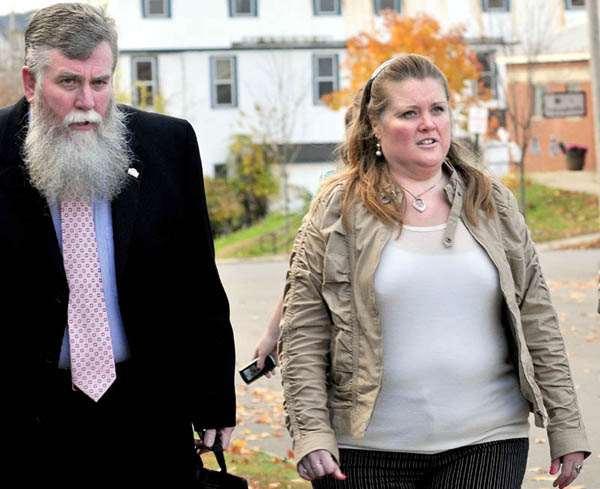A court hearing will be held in private Friday to determine whether an 11-year-old girl who is accused of killing an infant understands the severity and ramifications of the charge against her.
The competency hearing in Skowhegan District Court could determine whether Kelli Murphy of Fairfield goes on trial for manslaughter.
Judge Charles LaVerdiere ruled last month that the hearing would be closed to the public, even though proceedings for juveniles who are charged with felonies aren’t normally private under Maine law.
His decision appears to be without precedent and exposes a gray area in a state law that was adopted only two years ago.
The girl is charged with killing 3-month-old Brooklyn Foss-Greenaway of Clinton, who died in July while staying overnight at the home of Murphy’s mother, Amanda Huard.
Huard called 911 that night to report that the baby was not breathing.
An autopsy revealed that the infant died from suffocation and had in her system trace amounts of a prescription medication that matched medication Murphy was taking. The infant reportedly was in a bedroom with girl.
Murphy is the youngest person to be charged with manslaughter in at least 25 years, state police have said.
Huard has been blamed for leaving her daughter in charge of the baby even after the state Department of Health and Human Services said she was a danger to children and should not be left alone with young children.
A caseworker in the DHHS’s Office of Child and Family Services held Huard responsible for the baby’s death. Huard did not give Murphy her medication as required, the caseworker said.
Deputy Attorney General William Stokes has said that Huard was not charged after the assessment by the DHHS because prosecutors have a higher burden of proof in a criminal case than caseworkers have.
The DHHS documents said Murphy has behavioral problems including oppositional defiant disorder, attention deficit hyperactivity disorder and attachment disorder.
Ashley Tenney, who lived at Huard’s house last year, said in October that her own daughter, then 8 months old, almost died from medication that was the same as the medication taken by Murphy, who was left alone with the baby when the incident occurred in June.
Alison Beyea, an adjunct professor of juvenile justice at the University of Maine School of Law, said the new law that outlines procedures for juvenile competency is meant to ensure that a defendant’s competency is compared with the way another juvenile might understand the same situation, not how an adult might see it.
Because the law is silent on public access to juvenile competency hearings, Beyea said, judges likely will make decisions case by case, at least until the Maine Supreme Judicial Court is asked to rule on the question.
Murphy’s case appears to be the first test of the new law.
In October, Judge LaVerdiere ordered the competency hearing to determine whether Murphy has the mental acuity to stand trial. Her attorney, John Martin of Skowhegan, requested that the hearing be closed.
In general, if a child is charged with a felony, the public cannot be excluded from adjudicatory proceedings, under state law. But competency hearings are not considered adjudicatory proceedings and the law is silent on access to the hearings.
“Given the sensitive nature of the information presented at competency hearings and the inherent vulnerability of an 11-year-old juvenile, it seems illogical to allow the public access to such private information,” Martin wrote in a motion filed with the court.
Martin’s motion contends that “the public right of access to the competency proceeding is outweighed by the juvenile’s right to privacy.
The evaluation report here describes the juvenile’s mental illness and cognitive defects, her academic record as a child, her social history, and the physical abuse she experienced, all of which are presumed to be expressly closed to the public under (statute).”
Beyea, at the law school, agreed that competency hearings for juveniles often involve sensitive information, “beyond the scope of what you would see in an adult proceeding.”
Maine’s juvenile code is centered around rehabilitation, Beyea said, so at some point a juvenile will be released from custody, no matter how serious the conviction.
Assistant Attorney General Andrew Benson, who is prosecuting the case for the state, opposed Martin’s request to close the competency hearing.
He wrote that the defense “either ignores or minimizes three things; first, that proceedings on juvenile felony proceedings are open to the public by statute; second, the strong public policy interest in having such proceedings open to the press and other members of the public; and third, the fact that there is no provision in the juvenile code authorizing closed proceedings.”
Benson argued that the Legislature’s intent was obvious when it updated the statute two years ago. If it meant for competency hearings to be closed for juveniles, he said, it would “have made such a pronouncement plainly, without the tortured interpretation of somewhat inexact language currently relied upon by the juvenile defendant.”
Laverdiere disagreed in his order, dated Feb. 25, and said the competency hearing “cannot be considered an adjudicatory proceeding.“
Not only is it likely that much of the sensitive information uncovered during competency examinations will not be relevant to the public portions of the suspended juvenile matters, but also the juvenile competency statute explicitly renders information disclosed by the juvenile in the context of the examination inadmissible at the adjudicatory stage of a juvenile proceeding,” the judge concluded.
Laverdiere also wrote that revealing highly sensitive mental health and mental acuity information about the juvenile risks undermining the rehabilitative goals of Maine’s juvenile justice system.
Benson, however, argued that the competency hearing “could well be the final and most important step in the proceeding,” if the defendant is found not competent.
“For the court to make such a decision in a secret proceeding would violate the trust imposed by the public in its institutions of justice and diminish their confidence in those institutions,” he wrote.
But Beyea said that if Murphy is found incompetent, it will not be the final decision. The state and the court could request that steps be taken to restore her competency.
Beyea said it would be hard to find anyone so young competent to stand trial in a case so serious.
Eric Russell can be contacted at 791-6344 or at:
erussell@pressherald.com
Twitter: @PPHEricRussell
Send questions/comments to the editors.





Success. Please wait for the page to reload. If the page does not reload within 5 seconds, please refresh the page.
Enter your email and password to access comments.
Hi, to comment on stories you must . This profile is in addition to your subscription and website login.
Already have a commenting profile? .
Invalid username/password.
Please check your email to confirm and complete your registration.
Only subscribers are eligible to post comments. Please subscribe or login first for digital access. Here’s why.
Use the form below to reset your password. When you've submitted your account email, we will send an email with a reset code.